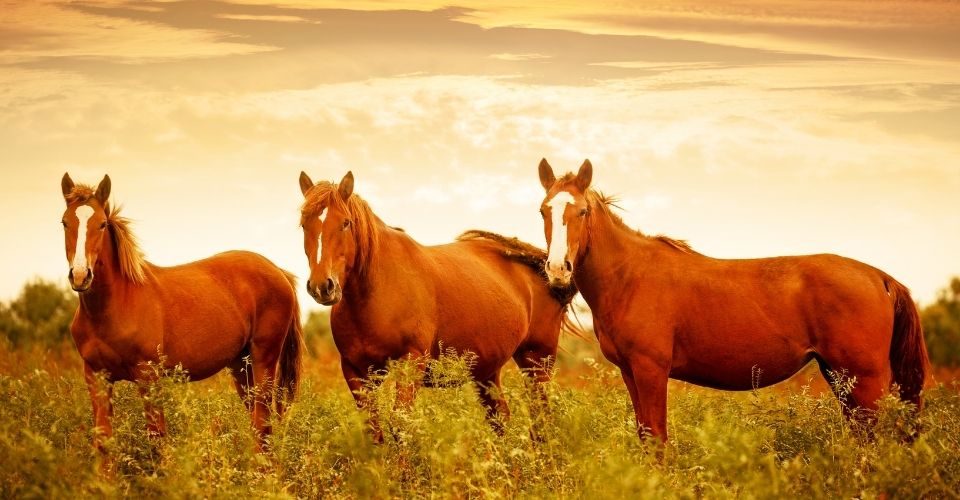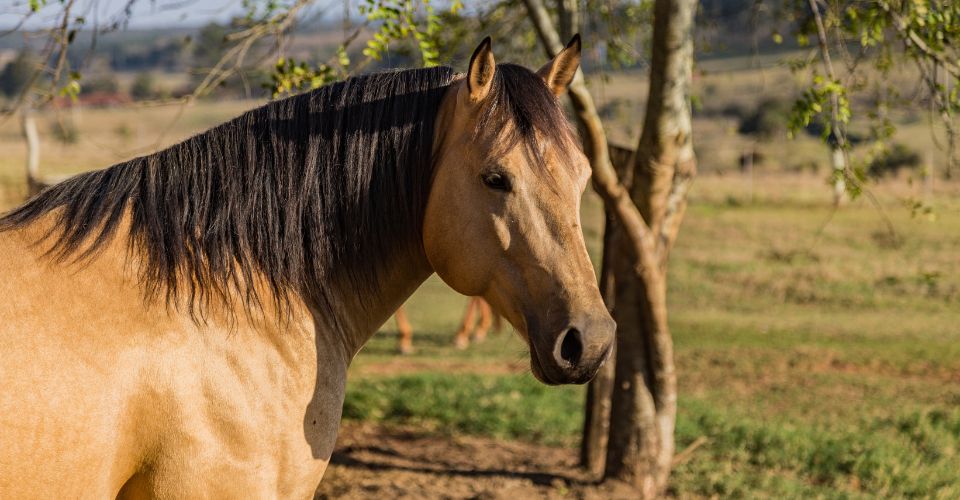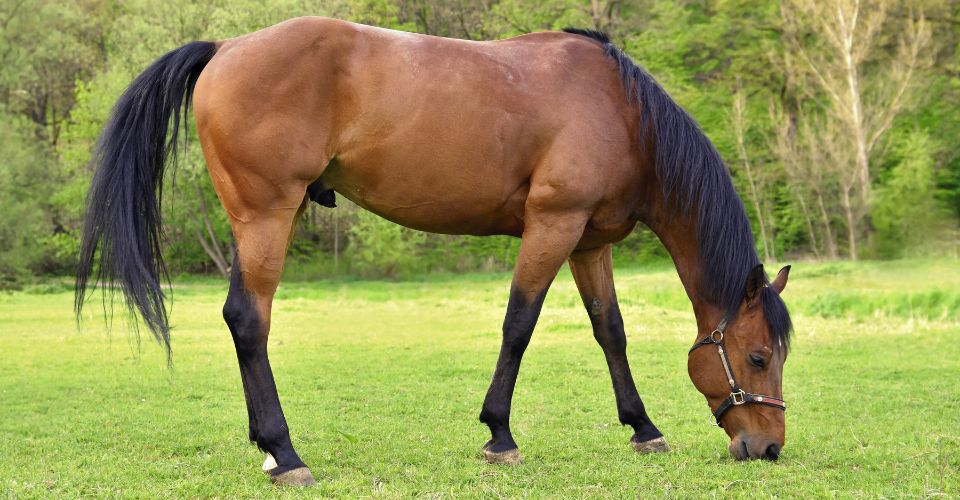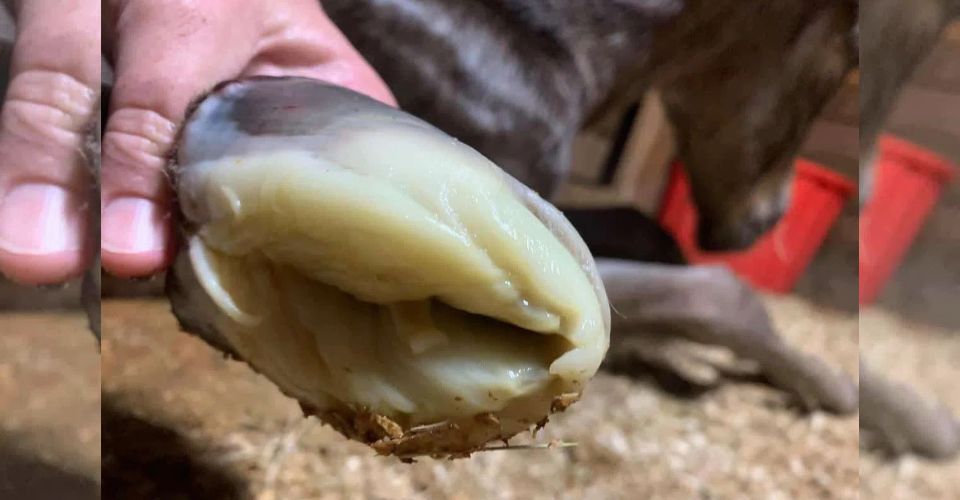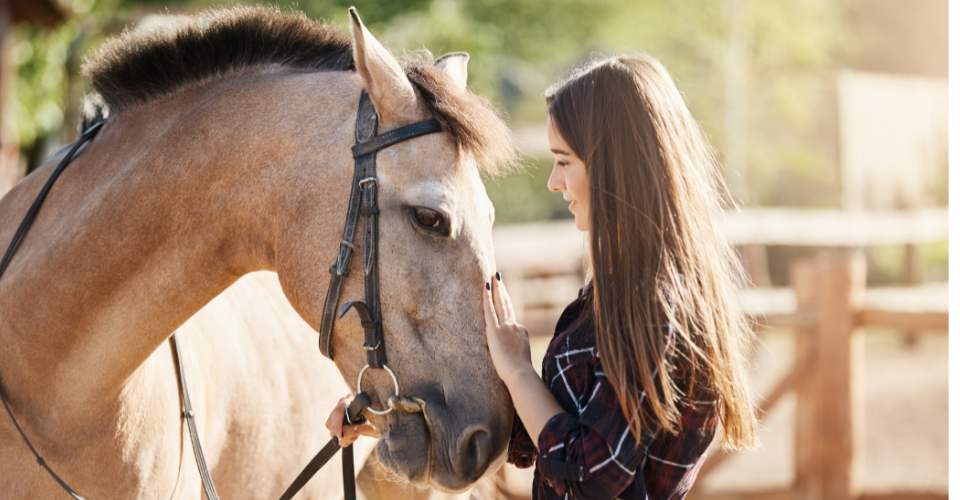How long do horses live? The lifespan of horses varies depending on the type of breed, care, and environment. The average lifespan of a horse is around 25-30 years. However, with better nutrition, proper grooming, and healthcare, their lifespan can be increased. The average life expectancy of domestic horses and ponies has increased, ranging from 25-35 years. Some horses can manage to cross their 40s and beyond, albeit with good care.
The Lifespan of Wild vs. Domestic Horses
Wild horses live for about 15-16 years, which is significantly lower than the average lifespan of domestic horses like Miniatures, Warmbloods, and racehorses that live for 25-35 years. It is probably because wild horses are more prone to accidents and bacterial and viral diseases. They may also yield to starvation or become prey to predatory animals.
The Lifespan of Different Breeds
Currently, there are over 300 known breeds of horses in the world. They come in different shapes, sizes, and colors and for different purposes. The life expectancy of one breed may be different from other breeds and types of horses. For instance, larger horses like draft breeds do not generally live as long as smaller breeds, such as Arabian horses. Similarly, ponies tend to live longer than larger horses—it is not unusual for them to make it to their late thirties.
Below is a breakdown of different breeds and their lifespans, giving a clearer picture of how long do horses live—usually.
| Breed | Average Lifespan (years) |
| American Quarter Horse | 20-25 |
| Percheron | 25-30 |
| Belgian Draft Horse | 25-30 |
| Icelandic Horse | 25-30 |
| American Paint Horse | 30-31 |
| Norwegian Fjord | 20-25 |
| Appaloosa | 29-30 |
| Arabian Horse | 25-30 |
| Clydesdale Horse | 20-25 |
| Friesian | 16-18 |
| Gypsy | 20-25 |
| Tennessee Walking Horse | 28-30 |
| Mustang | 15-20 |
Many of these breeds have been developed for explicit purposes. The type of breed is a major factor in the nature of work they may do in their lifetime. Horse breeds that do more energy-intensive and riskier jobs ultimately mean that they have a shorter life expectancy.
For example, horse racing is done with thoroughbred horses. It is a hazardous sport, and many horses sustain injuries from which they cannot recover completely. A racehorse may begin their career at 2 years old and finish at 10. When they retire, they are usually not accorded the kind of care and attention they received in their heydays. As a result, they may die earlier than their counterparts.
That said, if they—or any other horse, for that matter—are looked after well, they can live up to 30 years.
Oldest Horses
While there may have been horses that have lived long enough, we only know about a few. Some of them are as below, as Oldest.org reports.
| Sr. No | Horse (Breed) | Origin | Age (Era) |
| 1 | Old Billy (Big Cob/Shire Stallion) | Lancashire, England | 62 (1760 – 1822) |
| 2 | Sugar Puff (Shetland-Exmoor Pony Cross) | West Sussex, United Kingdom | 56 (1951 – 2007) |
| 3 | Badger (Arab-Welsh Coss) | Cardigan, Pembrokeshire, Wales | 51 (1953 – 2004) |
| 4 | Shayne (Irish Draught) | Brentwood, Essex, England | 51 (1962 – 2013) |
| 5 | Orchid (Thoroughbred-Arabian cross) | Cornwall, England | 50 (1965 – 2015) |
| 6 | Prospect Point (Thoroughbred) | Brentwood, Essex, England | 38 (1978 – 2016) |
Aging Signs: How to Know the Age of a Horse?
You can determine the age of a horse by looking at some signs briefly mentioned below. Though this will give only an idea and not an exact figure.
Teeth
By looking at a horse’s teeth, a skilled horse owner can determine its approximate age. Over time, horses’ teeth become longer and more inclined. But teeth are not a 100 percent precise way to determine their age, especially as they progress in age beyond their twenties. So unless a horse has some sort of competition passport or registration papers verifying its identity, information about its age may be lost.
Swayed Back
A horse’s back dips downward as they grow older. The withers become more bulging. If such is the case with a horse, know that it has lived a larger part of its life.
Rough Coat
As a horse ages, it loses its shine and gets a furrier appearance. Their coats get thicker and denser as they age, and some of their facial hair turns grey.
Loss of Muscle Mass
With time, horses lose the mass in their muscles, their flesh becoming looser and harder to firm up.
Lameness
In some cases, horses begin to have soundness issues, as if they are lame. Should that be the case, consider the horse aged—though you will have to take other factors into account.
Droopy Lips
Older horses that are very relaxed let their lower lip droop markedly.
Saggy Fetlocks
Another way to determine if a horse is aged is to look at its fetlocks. Older horses commonly have saggy fetlocks.
Weakened Eyesight
As in humans, horses too undergo changes in their vision as they age.
Deep Hollows Above the Eyes
Similarly, if the hollows above the eyes become deeper, it may be another sign of an aging horse.
Low Immunity
Lastly, the immune system. If you witness a horse not being able to withstand parasite infection, it may be having a weak immune system. Usually, it is older horses that have weak immune systems.
How Long Do Horses Live: Factors Affecting the Life Expectancy of Horses
How long do horses live depends upon certain factors, such as:
Workload
First, the workload. Horses that do intensive, heavy, and riskier tasks are more prone to have a shorter life expectancy than those who are engaged in light work, such as horses merely reserved for riding.
Nutrition
Nutrition is another important factor affecting the lifespan of a horse. If a horse gets hungry for too long, it may become weak and develop certain diseases such as ulcers.
The Number of Times They Have Reproduced
Frequent reproduction makes horses, and pretty every animal, weak. While such may not be the case in domestic horses, wild horses are more susceptible to get frequently pregnant. This is one of the many reasons that shortens the lifespan of a wild horse.
Diseases
This goes without saying, but diseases also decrease the lifespan of horses. Some diseases can prove fatal for horses. This is why horses need regular veterinary care so that they do not catch diseases.
Dental Health
Horse teeth never stop growing. They can develop uneven wear, which can lead to eating problems.
Common Causes of Early Death in Horses
Horses can die earlier due to various diseases and conditions that befall them over the course of their lifetime. If not treated in time, it can take your horse life. Horses are mostly prone to the following diseases.
- Colic and other gastrointestinal issues
- Cushing’s disease
- Lameness
- Laminitis
- Arthritis
How to Give Your Horse a Long and Healthy Life?

There are many things you can do to give a horse the best and longest possible life.
Proper Horse Food
What do horses eat? A horse’s diet should primarily consist of hay or grass, clean and free of dust and mold. Horses should have small portions of meals throughout the day and have constant access to food and water. Grains should also be included in their diet but scarcely since they’re high in carbs. They give horses energy, but an abundant amount of grain can lead to joint problems.
Make sure they have access to freshwater, or they’ll catch diseases. A horse should be able to graze as much as possible. The quality of the pasture is also vital since not all pastures provide sufficient minerals. Older horses should receive high-quality forage and grain and supplements as required.
The time of feeding is also important. Research shows that feeding older horses at the same time every day helps maintain their overall digestive health.
Gradual Diet Change
If the diet of a horse changes too quickly and too often, it may develop some digestive problems. So, while traveling with a horse, it is better that you bring along their usual food. Make food changes gradually rather than abruptly switching to a new diet.
Veterinary Care
Horses, like all other pets, need regular veterinary care. They may need some vaccinations, such as Rabies, Tetanus, Influenza, Botulism, Encephalomyelitis, Rotavirus, West Nile Virus, Strangles, Potomac horse fever, Equine viral arteritis, Equine herpesvirus 1, and Equine herpesvirus 4. The vaccinations they require depends on their age, location, and how much they travel. Vaccinations prevent horses from getting common infections and make their lives longer and healthier.
Horse’s manure needs to be checked for worms regularly. Deworming medicines, removing manure often, and giving the horse an open space can lower the risk of worms.
Horses’ teeth need to be checked and filed by a vet once or twice a year since they never stop growing. Eating problems can emerge if they develop uneven wear. Also, check their teeth for rotting.
Clean Stable
Horses need a clean space. Remove the manure or any other unused and unnecessary material daily. They should be safe from the weather, hence a barn or fully-closed building is suitable to protect them from rain, heat, wind, snow, and insects.
Besides housing, they need additional care during extreme weather; they need plenty of water when it’s hot out and a salt lick to prevent dehydration. When it’s cold or raining, give them a waterproof horse blanket.
Exercise
Horses need regular activity; they need to be taken for rides more often. They require a pasture to walk around that has a sturdy fence and not a barbed wire. Horses should not be kept in stall the whole day unless they’re hurt or suggested so by a vet.
Hoof Care
Healthy hooves mean healthy horses. Horses’ exercise can be halted if it has a hoof problem. Hence, trim their hooves every month or two and put horseshoes on to keep their hooves in superb condition.
Socialize Your Horse
Horses are herd animals and are joyful when around other horses and their caretakers. Allow your horse to graze with friendly horses, it contributes to their satisfaction. Caretakers need to spend time with their horses by grooming, petting, and talking to them, as it affects their overall well-being positively and helps extend their lifespan.
So, how long do horses live? As we mentioned, on average, around 25 – 35 years. But some like the Old Billy can live as long as 62 years. If a horse is given proper care and attention, it can easily cross the forty mark.

